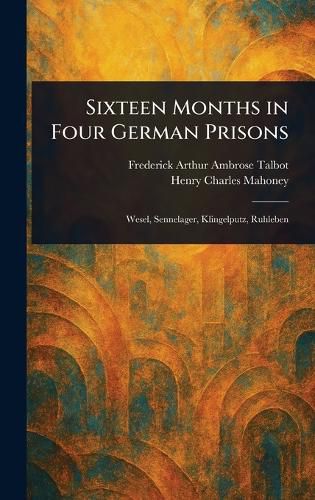Readings Newsletter
Become a Readings Member to make your shopping experience even easier.
Sign in or sign up for free!
You’re not far away from qualifying for FREE standard shipping within Australia
You’ve qualified for FREE standard shipping within Australia
The cart is loading…






This title is printed to order. This book may have been self-published. If so, we cannot guarantee the quality of the content. In the main most books will have gone through the editing process however some may not. We therefore suggest that you be aware of this before ordering this book. If in doubt check either the author or publisher’s details as we are unable to accept any returns unless they are faulty. Please contact us if you have any questions.
Experience the realities of captivity during World War I in Frederick Arthur Ambrose Talbot's "Sixteen Months in Four German Prisons: Wesel, Sennelager, Klingelputz, Ruhleben." This gripping firsthand account details the author's harrowing experiences as a prisoner of war in Germany.
Talbot vividly recounts his time in four distinct prison camps: Wesel, Sennelager, Klingelputz, and Ruhleben, offering a rare glimpse into the daily lives and struggles of prisoners during the Great War. From the initial capture to the challenges of survival within the prison walls, this book presents an unflinching portrayal of life as a POW.
A vital historical document, this book is a must-read for anyone interested in World War I, military history, and the experiences of those caught in the conflict. Discover the resilience of the human spirit amidst the hardships of war through this timeless narrative of endurance and survival.
This work has been selected by scholars as being culturally important, and is part of the knowledge base of civilization as we know it.
This work is in the public domain in the United States of America, and possibly other nations. Within the United States, you may freely copy and distribute this work, as no entity (individual or corporate) has a copyright on the body of the work.
Scholars believe, and we concur, that this work is important enough to be preserved, reproduced, and made generally available to the public. We appreciate your support of the preservation process, and thank you for being an important part of keeping this knowledge alive and relevant.
$9.00 standard shipping within Australia
FREE standard shipping within Australia for orders over $100.00
Express & International shipping calculated at checkout
This title is printed to order. This book may have been self-published. If so, we cannot guarantee the quality of the content. In the main most books will have gone through the editing process however some may not. We therefore suggest that you be aware of this before ordering this book. If in doubt check either the author or publisher’s details as we are unable to accept any returns unless they are faulty. Please contact us if you have any questions.
Experience the realities of captivity during World War I in Frederick Arthur Ambrose Talbot's "Sixteen Months in Four German Prisons: Wesel, Sennelager, Klingelputz, Ruhleben." This gripping firsthand account details the author's harrowing experiences as a prisoner of war in Germany.
Talbot vividly recounts his time in four distinct prison camps: Wesel, Sennelager, Klingelputz, and Ruhleben, offering a rare glimpse into the daily lives and struggles of prisoners during the Great War. From the initial capture to the challenges of survival within the prison walls, this book presents an unflinching portrayal of life as a POW.
A vital historical document, this book is a must-read for anyone interested in World War I, military history, and the experiences of those caught in the conflict. Discover the resilience of the human spirit amidst the hardships of war through this timeless narrative of endurance and survival.
This work has been selected by scholars as being culturally important, and is part of the knowledge base of civilization as we know it.
This work is in the public domain in the United States of America, and possibly other nations. Within the United States, you may freely copy and distribute this work, as no entity (individual or corporate) has a copyright on the body of the work.
Scholars believe, and we concur, that this work is important enough to be preserved, reproduced, and made generally available to the public. We appreciate your support of the preservation process, and thank you for being an important part of keeping this knowledge alive and relevant.